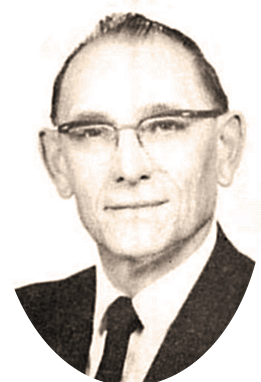In this series we are reprinting Spokesman articles by early leaders in the CLC. Pastor James Albrecht is the curator of the series. Rev. Egbert Schaller (1904-1971) was pastor at Faith Lutheran Church in Nicollet, Minnesota, and later became a professor of Greek and Hebrew at Immanuel Lutheran College. This article is from the Lutheran Spokesman of April, 1961. Scripture quotations are from the King James Version.
“Jehoshaphat made ships . . . to go to Ophir for gold: but they went not; for the ships were broken at Eziongeber.” (1 Kings 22:48)
At the shipyards in Eziongeber, near Eloth on the Red Sea, you might have seen a big project in the making. It was an ambitious plan that had been launched—of the sort to which men might aspire when they are moved by the memory of their great forefathers and seek to follow in their footsteps.
But this venture was taken without the blessings that God bestows on the truly great and must often withhold from their imitators.
Those shipyards had been erected by Solomon in the heyday of his glory. In the days of his youth and strength, when his heart was not yet drawn away from his God, he had laid keels for a whole fleet of ocean-going vessels which he sent to far-off places in search of treasure. The flotilla had returned with strange tales of distant Ophir and with a vast cargo of its gold. For the hand of God was with Solomon in all that he did.
Now once again the dry-docks at Eziongeber were bustling with workmen as the building of a new fleet neared completion. But the mighty men involved in this construction were not Solomon’s. Ahaziah was king of Israel as another son of Ahab, Jehoshaphat, was king of Judah. They had embarked together upon a plan that should bring them fortune, if not fame. Solomon did it; why not we? They were going to re-enact the feat of David’s great son and successor. From the rich mines of Ophir gold would come by their ships to illumine the land of the Jews with its soft and mellow glow. They had visions of a glory that had not been seen in Canaan since the decline of the nation that was named God’s people but had departed from His Word in so large a measure.
The ships hardly managed to get their keels wet before they were turned into kindling. There is a touch of irony in the words of the holy writer. “They went not.” The means by which the destruction was caused is not expressly mentioned; but we may safely assume that the ships were piled on the rocks by tremendous storms.
Yes, the lesson is simple. But many have been the shipwrecks and bitter disappointments of those who turned their hearts from its truth. Inevitable disaster—that is the epitaph written over many a broken dream of achievement. In any enterprise, it is not we, but the quality of our associations that determines success or failure, especially for people like Jehoshaphat who, themselves God-fearing, want to serve the Lord and aspire to glory for His sake. Alas, sometimes they cannot accept the plain truth that no undertaking, be it ever so promising and worthwhile in itself, and honestly endowed with good intentions, can succeed when the blessing of God does not abide upon it. And God commits Himself to no venture, indeed to no aspiration, which for its attainment requires unequal yoking of the godly and the ungodly, a union of darkness and light. Collaboration between truth and error never glorifies the Gospel and never builds or edifies the Church; it helps no one but the errorist, and him only to his downfall. Jehoshaphat and God could indeed have brought gold from Ophir; Jehoshaphat and Ahaziah never. Christian ships of achievement do not sail without God in sole partnership.
Jehoshaphat, after sitting crushed upon the shore covered with the litter of his shattered ships, arose and returned home a better ruler of God’s nation. At long last he had come to see that there is no future in a sinful union. Someone once wisely wrote that disappointments are like a sieve. Through its holes the base and worthless motives fall and leave the precious grains of faith to be preserved. Something better than the gold of Ophir then remains to glorify God and enrich heart and life.

(1904-1971)

